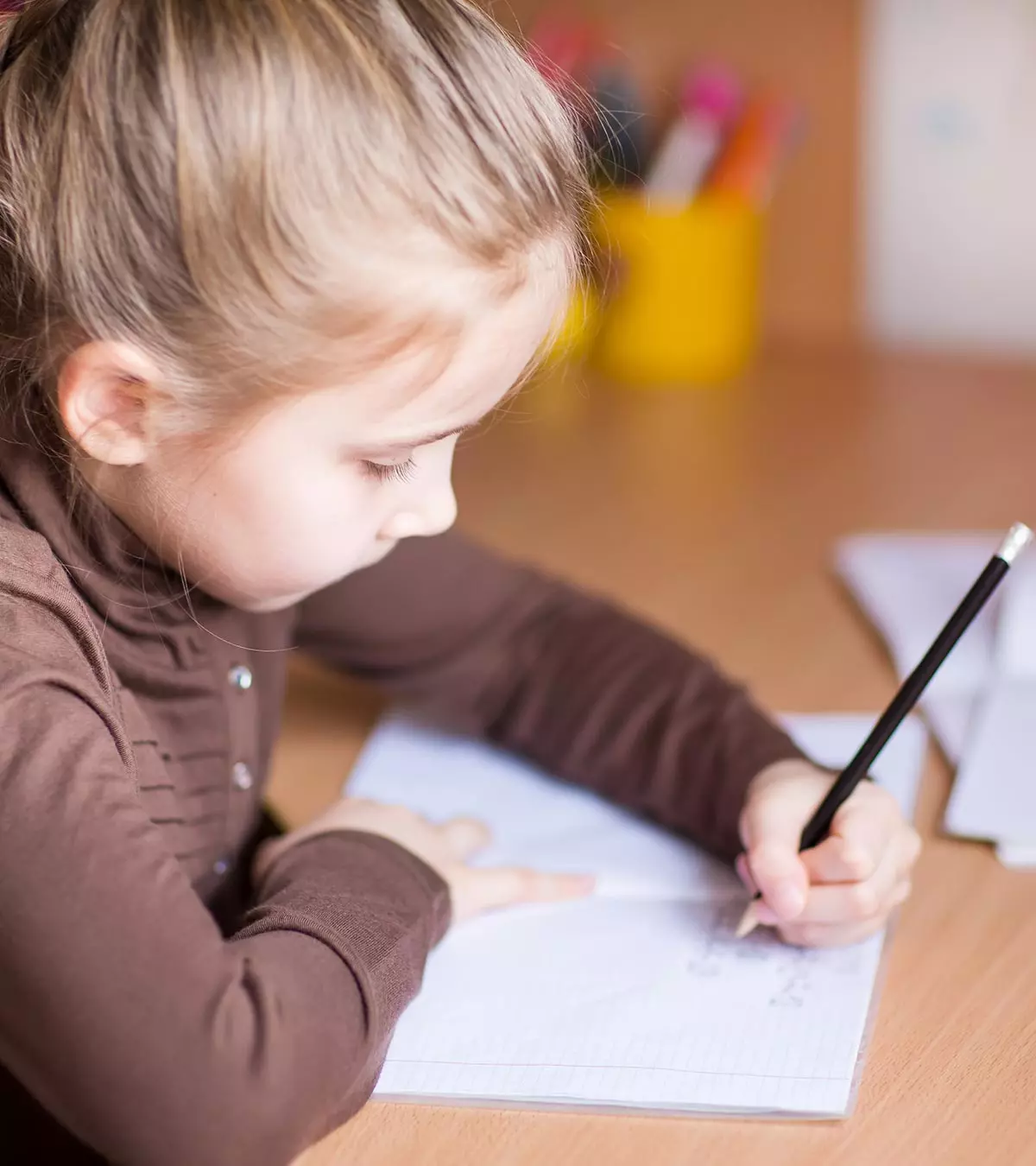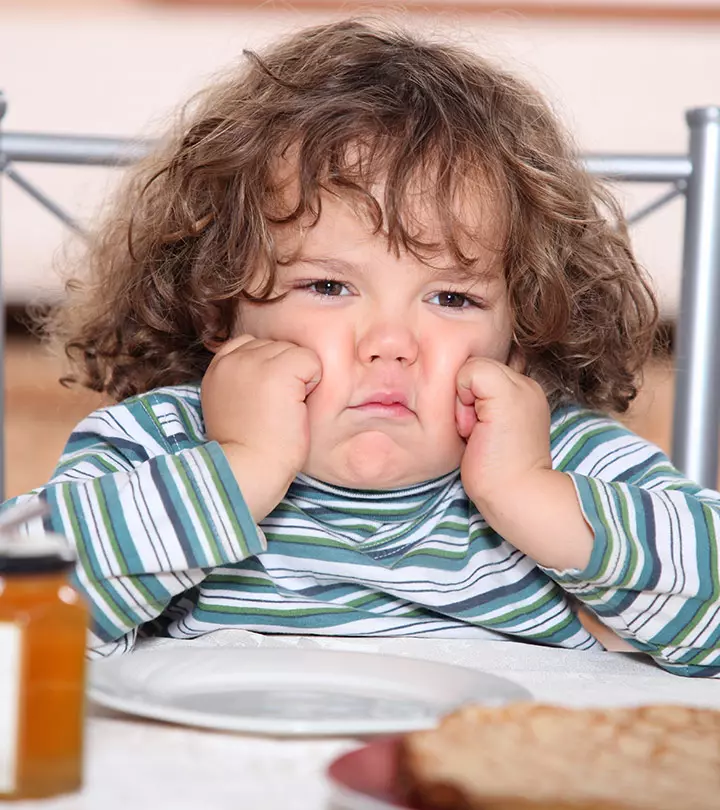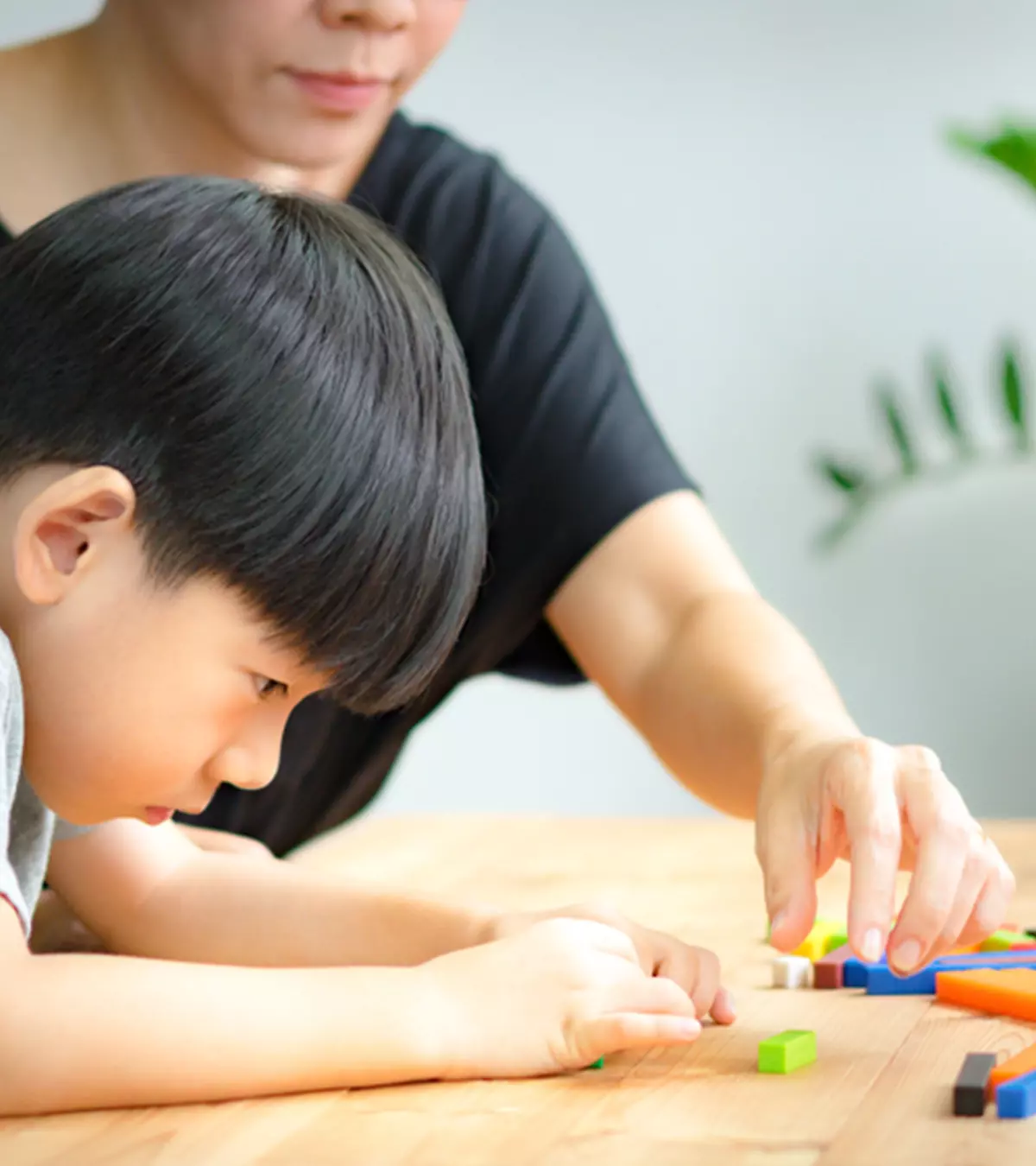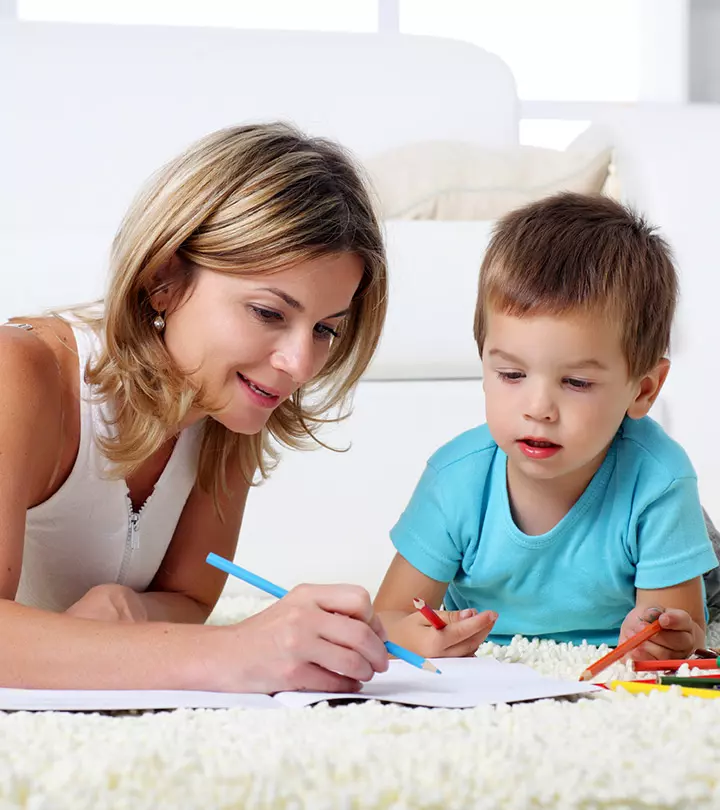
Image: ShutterStock
Research has shown that encouraging your child to develop their drawing skills can have several benefits. However, are you wondering what the role of drawing could be in your child’s growth process and what the stages of drawing development in children are? If yes, this post could help you understand the benefits of promoting this skill to enhance your child’s overall developmental skills.

Keep reading to discover the important stages of drawing development in children at different ages and their significance in your child’s life.
Key Pointers
- Drawing ability depends on interest, practice, and various other factors.
- Drawing reflects milestones in skill, creativity, emotions, academic growth, and mastery.
- The five stages of drawing comprise scribbles, lines, shapes, symbols, and detailing.
- At nine years old, children organize space, define gender roles, and develop adult perspectives.
- Artwork matures through self-critique, understanding of mediums, tools, environments, subjects, and life experiences.
Drawing Development In Children
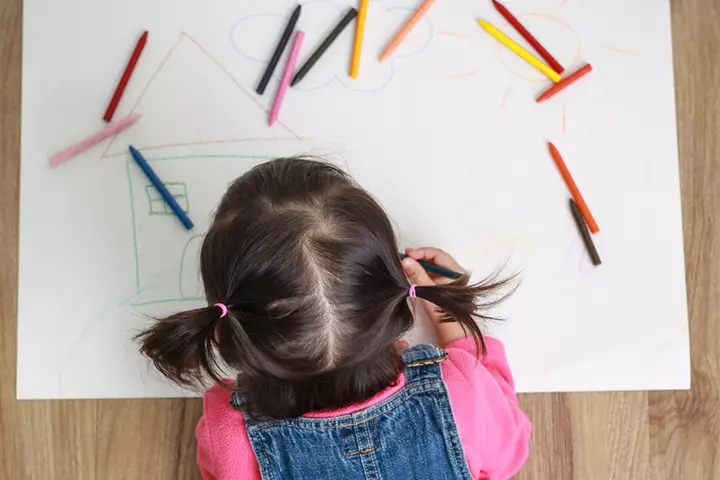
Typically, drawing development stages include general art development guidelines, as each child has a different growth trajectory. Some kids may never reach their potential in terms of drawing development, due to reasons such as lack of interest. This is quite normal and does not affect your child’s development.
Psychologists and educators have long researched the way children showcase their growth milestones through their drawing skills and various drawing development stages in a child’s life.
Stages Of Drawing Development
Child development drawing stages depend on your child’s age. Here are the five stages of drawing development in children (1) (2):
1. Between 2 and 4 years
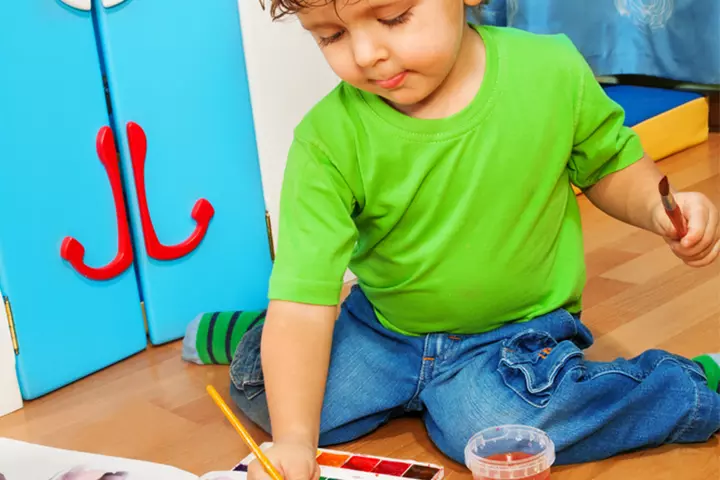
Random picture drawing and scribbling define this stage as your child begins to move the arm and work with a drawing tool such as a crayon or a pencil. Scribbling also helps a child develop hand-eye coordination. Give your child crayons, colored pencils, and big sheets of paper to spark their creativity. Join in the fun by drawing with them or asking about their scribbles to keep them engaged.
They will draw lines and dots and just scribble away on a drawing surface. It is here where the creativity of a child has the full room to develop as they have no notion of the real appearance of any object.
 Do remember
Do remember2. Between 3 and 7 years
At this stage of pre-schematic art, your child uses different geometrical shapes and lines to draw the objects. It is here where the child will use various combinations of circles, squares, and lines to represent objects in their environment (3).
However, they still aren’t quite aware of how these objects are organized. Thus, the pictures may appear to be floating on the drawing surface before your child learns to arrange them logically.
3. Between 6 and 11 years
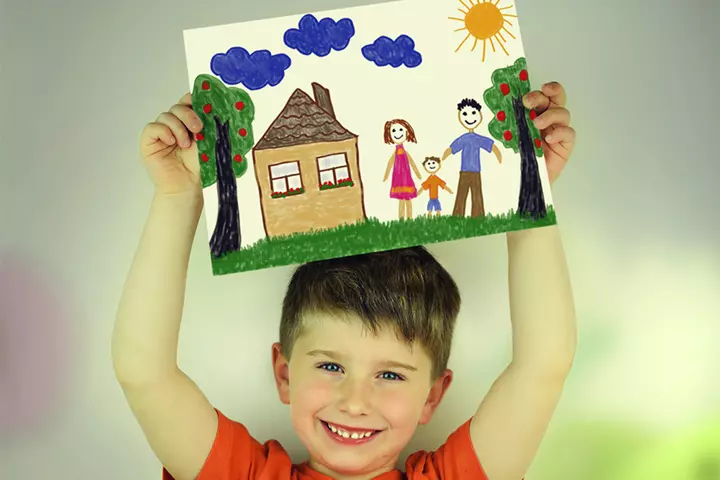
Children can reach the schematic stage between 6 to 11 years of age. This stage is all about the ‘schema’, which means adhering to the same symbol to represent a specific object. For instance, your child draws houses the same way every time. Their drawings also become more realistic and detailed.
As they advance through this stage, they may begin to use multiple baselines and arrange the drawings into different layouts. Not all children reach the peak of this stage if they are devoid of adequate drawing practice.
4. 9 years and older
This is the transitional stage and by this time a child’s drawing skills improve to a great extent. Your child might be able to create art per the standards of an adult’s observation, understanding, and interpretation. However at this stage, their childhood still takes over, and they transition between this stage and the previous stage of schematics.
One significant developmental milestone at this stage is that the child begins to define gender roles for people they draw through items of clothing and other finer details in their artwork. Their improved spatial perspective is also evident in their drawings.
5. Twelve years and older

The last stage is the stage of realism in a child’s art. The child becomes an astute artist as far as their understanding of the medium is concerned. The child now knows more about art, drawing tools, their subjects, and their environment.
They also know what mature artwork looks like and begin to draw as per their new understanding of life. The self-critical aspect of their drawings also defines this stage.
 Did you know?
Did you know?Significance Of Drawing Development Stages In A Child’s Life
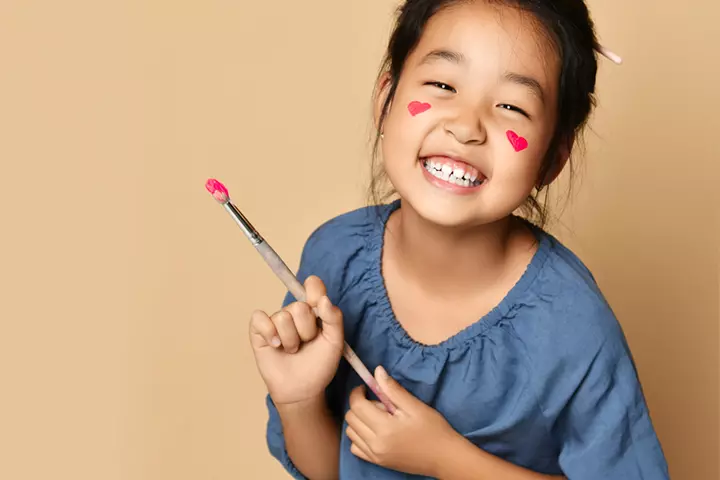
- Drawing not only helps your child’s growth in many ways, but the activity can also give you a glimpse into your child’s developmental milestones and supplement their learning in many ways. Drawing can promote communication, particularly in young children who may not have developed the ability to express their emotions accurately through words. It is a crucial medium that allows children to generate a variety of forms that can elicit enthusiasm and aesthetic pleasure.
- Drawing develops your child’s fine motor skills (using hands and fingers for various tasks). You can introduce your kids to different drawing tools to further improve their fine motor skills (1) (4).
- Drawing enhances a child’s creativity and imagination. Encourage your child’s creative development by providing ample opportunities for experimentation through drawing. Try to resist the urge to interfere with coloring books or instructions especially during the first stage (1).
- Drawing activities help a child’s emotional functioning and hence help the child in other areas of their life, such as academics. It helps develop problem-solving skills and perseverance. Using this great tool can assist your child’s growth in so many ways (5).
- Nurture your child’s artistic passion by showing appreciation for their creative endeavors, whether they involve sculpting, painting, sketching, tracing, shading, or doodling.
Frequently Asked Questions
1. Does drawing help with cognitive development?
Yes, like writing and reading, drawing promotes the ability to process, perceive, and attempt. All these skills contribute to cognitive development.
2. How can drawing help children?
Besides cognitive and fine motor skills, drawing provides an opportunity to interact with others and improve social skills. They can see and understand things differently, which makes them feel different emotions deeply.
3. How can parents and caregivers support and encourage a child’s drawing development?
Give your child age-appropriate art supplies and a designated place to draw peacefully. Let them experiment with their ideas and be creative. Allow them to draw or paint what they want and provide specific feedback on their progress, creativity, and unique style. You can also suggest drawing ideas for kids so they can explore various subjects. Engage in drawing and draw what you like to inspire the child to do the same. Take them to art exhibitions or museums and encourage them to explore art books to provide guidance and ample learning opportunities (7). You can also consider enrolling them in art classes or workshops.
4. How can drawing be used as a tool for communication and self-expression in children?
Young children cannot use appropriate vocabulary and written words to communicate. However, they can express their thoughts, feelings, and emotions through drawing and painting. Drawing enables them to create visual symbols representing specific objects, people, or concepts, allowing them to communicate complex ideas in a simplified and accessible way. It gives them a channel to reflect on themselves and their experiences, which increases their self-awareness (8).
5. Are there any differences in drawing development between boys and girls?
Small-scale research highlights that females drew more houses, trees, flowers, and sky than males, who drew only people and vehicles. These results indicate that girls are more likely to add details to the drawing and add a touch of finesse than boys (9). However, more research is needed to confirm these gender differences in drawing patterns.
The stages of drawing development in children may differ as per their age, lasting from two to twelve years and above. Encouraging your child to explore their creativity through drawing can foster a sense of pride and increase their self-confidence. Not only will they master the skill, but will also aid in improving their motor and creative skills. Until around seven years, your child may be able to draw only lines, simple pictures, and various shapes to create objects. However, encourage them to be consistent in the art, and soon, they will be able to draw realistic and stunning pieces.
Infographic: Tips To Encourage Drawing In Children
Drawing in children is highly beneficial. From learning to make figures to choosing colors, many skills are built. Children use drawings to express creativity and emotions, but how can you keep this motivation going in the long run? In this infographic, we share some easy tips to encourage your child to draw more. Illustration: Momjunction Design Team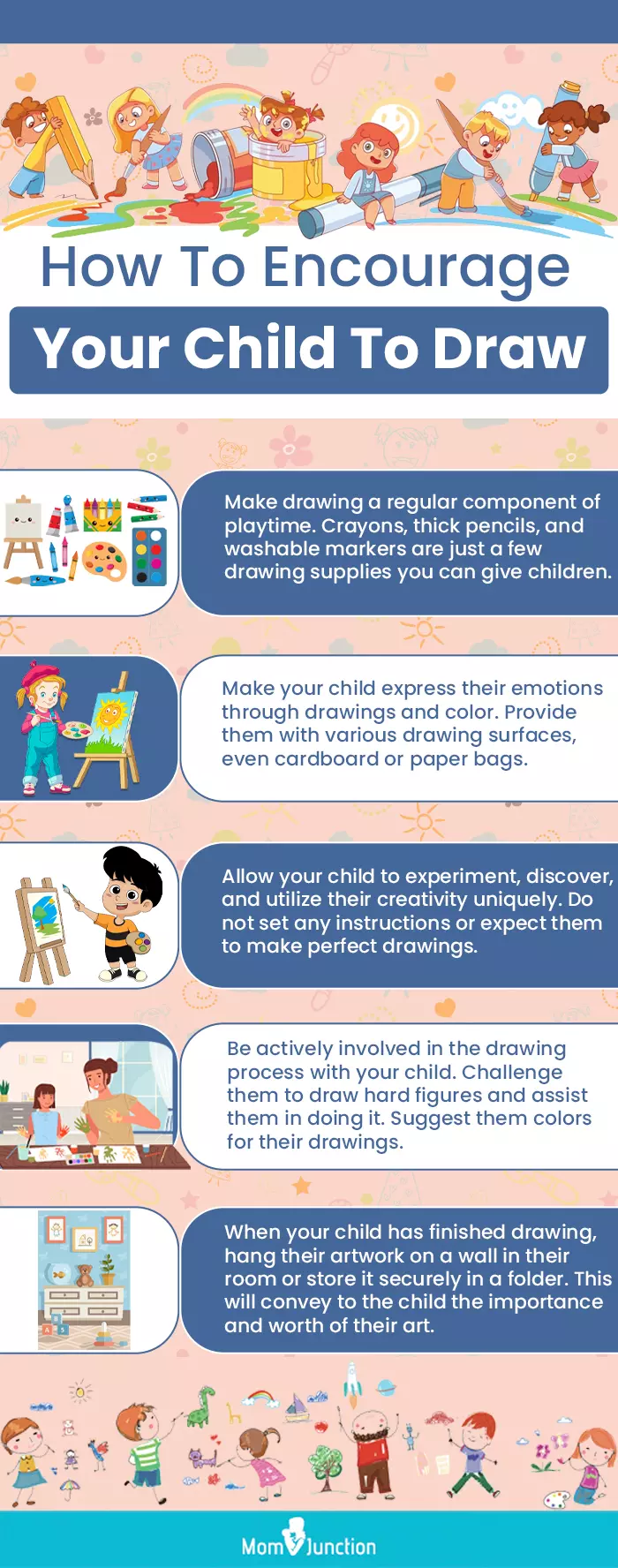
Illustration: Important Stages Of Drawing Development In Children
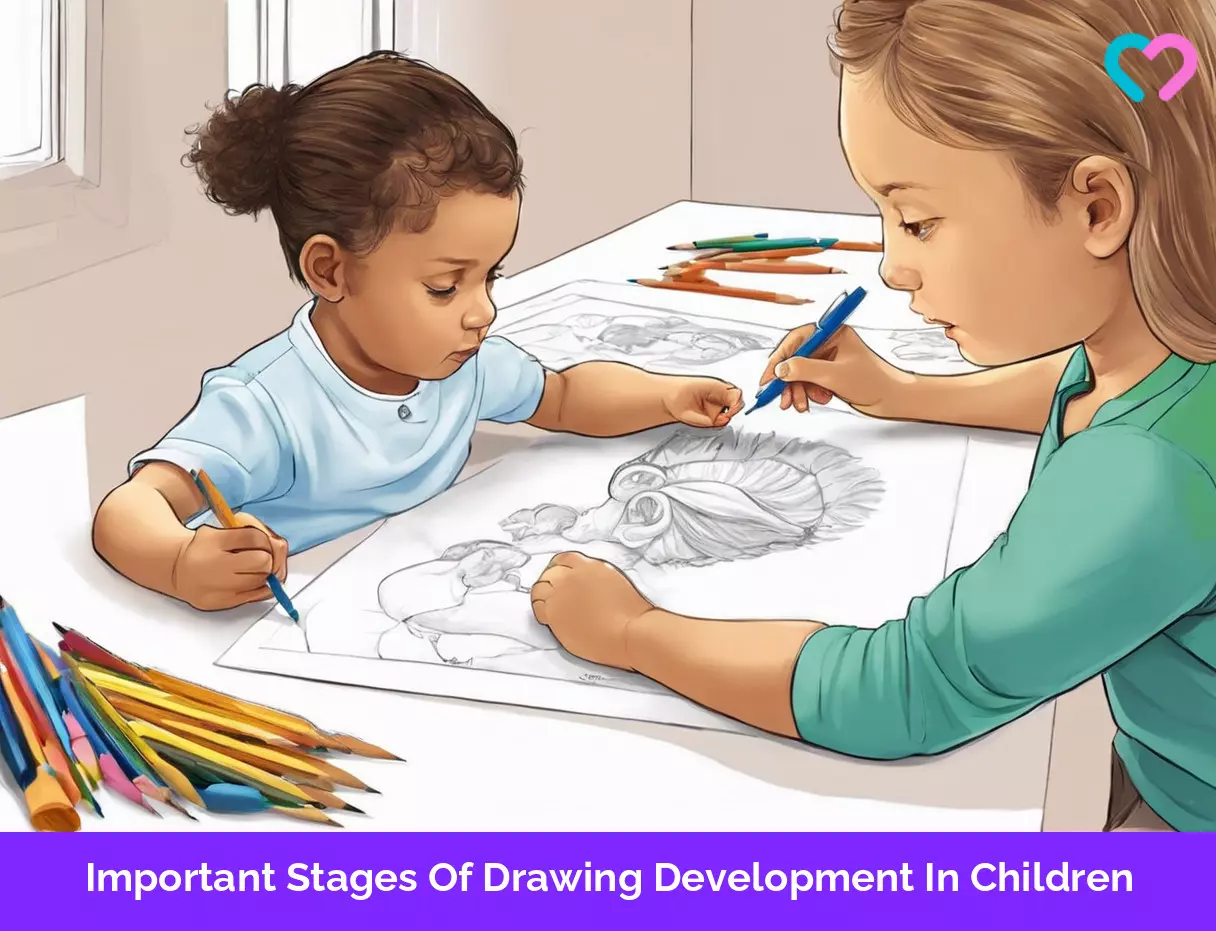
Image: Stable Diffusion/MomJunction Design Team
Observe the fascinating progression of young children’s artistic abilities, from initial scribbles to recognizable shapes and figures, as they develop their drawing skills.
References
- Learning to Write and Draw.
https://www.zerotothree.org/resource/learning-to-write-and-draw - Wirawani Kamarulzaman; Children’s Drawings and Development (2012).
https://www.researchgate.net/publication/272243405_Children’s_Drawings_and_Develop - Preschooler development.
https://medlineplus.gov/ency/article/002013.htm - Perceptual and Motor Development Domain.
https://www.cde.ca.gov/wafalert.html?_event_transid=86bd800e9439d193b9df002254442bbc86ca4de76bedf9b6a76ad197837ec6ff - Drawing Plays an Important Part in Children’s Emotional Roles.
https://www.arts.gov/stories/blog/2015/drawing-plays-important-part-childrens-emotional-roles - Discover the advantages that drawing and painting have for children!
https://maryelschool.org/discover-the-advantages-that-drawing-and-painting-have-for-children-2/ - The art of creating: Why art is important for early childhood development.
https://www.canr.msu.edu/news/the_art_of_creating_why_art_is_important_for_early_childhood_development - Exploring Children’s Communication through Art in the Early Years: The Role of the Teacher.
https://core.ac.uk/download/pdf/234641275.pdf - Monochrome Males and Colorful Females: Do Gender and Age Influence the Color and Content of Drawings?
https://journals.sagepub.com/doi/10.1177/2158244013509254
- Learning to Write and Draw.
Community Experiences
Join the conversation and become a part of our nurturing community! Share your stories, experiences, and insights to connect with fellow parents.
Read full bio of Dr. Regina A. Hardin
Read full bio of Debolina Raja
Read full bio of Harshita Makvana
Read full bio of Nisha Bharatan










